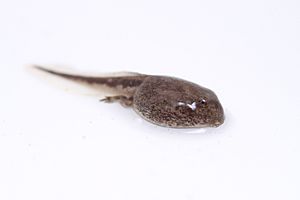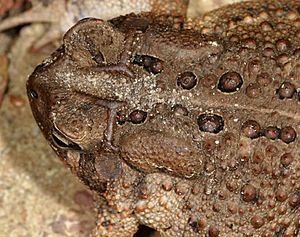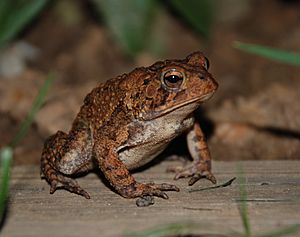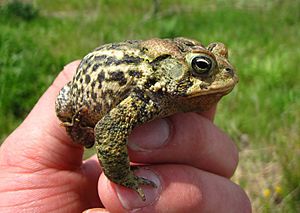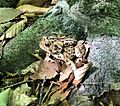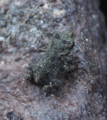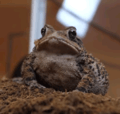American toad facts for kids
Quick facts for kids American toad |
|
|---|---|
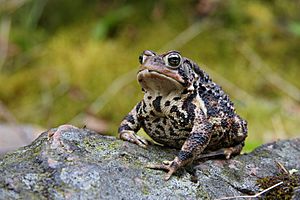 |
|
| Conservation status | |
| Scientific classification | |
| Kingdom: | |
| Phylum: | |
| Class: | |
| Order: | |
| Family: | |
| Genus: | |
| Subgenus: |
Anaxyrus
|
| Species: |
B. americanus
|
| Binomial name | |
| Bufo americanus Holbrook, 1836
|
|
| Subspecies | |
|
|
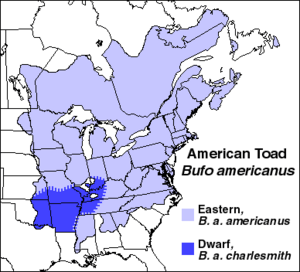 |
|
| Habitat range of B. americanus | |
| Synonyms | |
|
Anaxyrus americanus |
|
The American toad (Bufo americanus) is a type of toad found in North America. These toads live in the eastern United States and Canada. There are three main kinds, called subspecies: the eastern American toad (A. a. americanus), the dwarf American toad (A. a. charlesmithi), and the rare Hudson Bay toad (A. a. copei).
Contents
Life Cycle of the American Toad
American toads start their lives as tiny eggs. The female toad lays her eggs in two long strings in the water. These eggs usually hatch into tadpoles in about 2 to 14 days.
When they hatch, American toad tadpoles are easy to spot. They have small, black bodies and very thin tails. They grow into adult toads in about 50 to 65 days.
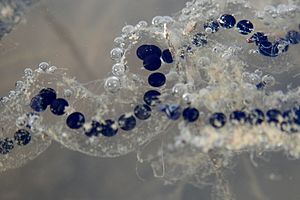
Once they finish changing, these young toads are called "toadlets." They might stay in the water for a short time. Soon after, they move onto land. Often, many toadlets will change at the same time. Then, they all move together to higher, shady areas. These areas are usually forests next to the marshes where they were born.
Toadlets eat tiny bugs they find among plants. Adult toads enjoy a diet of crickets, mealworms, earthworms, ants, spiders, slugs, centipedes, moths, and other small invertebrates.
How Tadpoles Stay Safe
American toad tadpoles have clever ways to avoid being eaten. They often swim in very shallow water. This water usually has lots of thick grass for them to hide in. During the day, they swim close together in large groups, called schools. This can make it harder for predators to pick one out.
Tadpoles also have a special defense. Their skin makes chemicals that taste bad to some animals. Some fish have even died after eating just one tadpole. Most fish quickly learn not to eat them. The tadpoles are also very small and completely black, which helps them blend in.
Types of American Toads
There are three different subspecies of the American toad. Each one has unique features.
Eastern American Toad
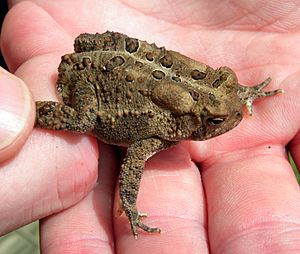
The eastern American toad is a medium-sized toad. It usually grows to be about 5 to 9 centimeters (2 to 3.5 inches) long. The biggest one ever found was about 11.1 centimeters (4.4 inches) long. Their color and patterns can change a lot. This depends on where they live, how much moisture is in the air, how stressed they are, and the temperature. Their skin can be yellow, brown, or black. It can be a solid color or speckled.
When male toads are ready to mate, they make a loud, high-pitched trill. This sound can last from 6 to 30 seconds. It sounds a bit like a ringing telephone.
These toads can also release a substance that tastes bad to animals that try to eat them. This substance is called Bufotoxin. It's not as strong as poisons from some other toads. However, it can make human skin itchy. It is also dangerous for smaller animals, like dogs, if they swallow it.
Eastern American toads need a few things to live happily. They need a pond or pool with shallow, fresh water for breeding. They also need thick plants for hiding and hunting. If they have these things and enough insects to eat, they can live almost anywhere. This includes forests and open grasslands.
Some of these toads have lived for over 30 years! One female toad, over 13 centimeters (5 inches) long, is still healthy in her late 30s. When it gets cold, these toads dig backward into the dirt. They bury themselves to hibernate until warmer weather returns.
Dwarf American Toad
The dwarf American toad (B. a. charlesmithi) is a smaller version of the American toad. It grows to about 6 centimeters (2.4 inches) long. These toads are usually a dark reddish color. Some isolated groups can be a lighter red.
Some dwarf American toads have a white line down the middle of their backs. They mostly eat spiders, worms, and small insects.
Hudson Bay Toad
The Hudson Bay toad (A. a. copei) is a rare subspecies of the American toad. It is found in Canada. These toads have been seen in the northern parts of Ontario. They live in a few separate groups there.
These northern dwarf toads often have red coloring on the sides of their bodies. They also have more warts than other subspecies. However, when they breed with eastern American toads, they can lose the red color on their backs.
Images for kids
See also
 In Spanish: Sapo americano para niños
In Spanish: Sapo americano para niños



